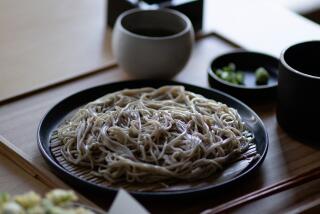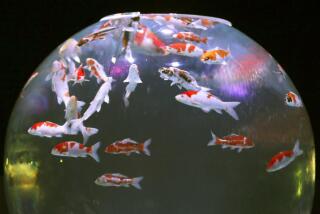Japanese found to host seaweed-digesting bacteria
- Share via
Bacteria in the guts of some Japanese people may have acquired the ability to digest seaweed because of the sushi their human hosts consume, researchers have reported. The evolved trait enables their human hosts to digest carbohydrates found in edible seaweed such as nori, whose tough cell walls the human body cannot process on its own.
The finding, published Thursday in the journal Nature, was stumbled upon by biochemists at the National Center for Scientific Research and Pierre and Marie Curie University in France while seeking enzymes that could digest carbohydrates in the walls of certain red algae.
They were not surprised to discover genes carrying the code for such enzymes in several seaborne microbes that live and feast on the algae.
But they were surprised when a genetic database revealed evidence of the same genes in a completely different habitat: the human gut, specifically, a Japanese gut.
“We were astonished,” said study co-author Mirjam Czjzek of the university’s Roscoff Biological Station. “But rather quickly, when we saw it was a Japanese sample, we got the connection.”
The researchers then searched for signs of the genes in two sets of data: one gathered from bacteria living in the guts of 18 North Americans and the other from those of 13 Japanese. They found signs of the enzymes in five of the Japanese samples, but none in those from the North Americans.
Scientists theorize that the gut bacteria acquired the genetic instructions to make the enzymes when DNA was transferred to them from bacteria living on the nori seaweed that the Japanese were wrapping around their sushi.
Just how long ago the genetic transfer occurred is unclear, said Justin L. Sonnenburg, a Stanford University microbiologist who was not involved in the study. It’s also unclear how the genetically altered bacteria survive from one generation of guts to the next.
“This is something we don’t really know; we don’t understand how it happens that well,” he said.
Czjzek said it is quite possible that there are also North Americans not of Japanese ancestry with the ability to digest nori.
But sushi is a relatively recent introduction to North American cuisine, so it’s unlikely that contemporary sushi eaters’ gut flora would have been exposed to enough marine bacteria to pick up the genetic trait, said Sonnenburg, who wrote a commentary in Nature accompanying the study.
“I think this likely happened back when diets were much less sterile, and the seaweed was teeming with marine microbes,” he said. “And I think probably the nori wrappers we find on sushi wraps in the States probably have a lot less microbial burden today.”
More to Read
Sign up for Essential California
The most important California stories and recommendations in your inbox every morning.
You may occasionally receive promotional content from the Los Angeles Times.











